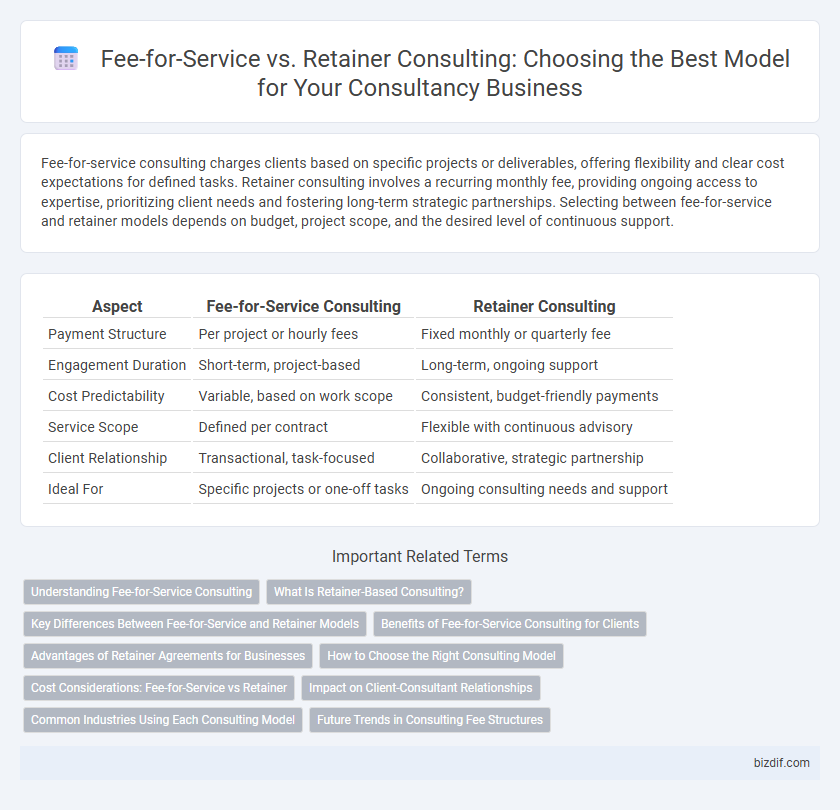Fee-for-service consulting charges clients based on specific projects or deliverables, offering flexibility and clear cost expectations for defined tasks. Retainer consulting involves a recurring monthly fee, providing ongoing access to expertise, prioritizing client needs and fostering long-term strategic partnerships. Selecting between fee-for-service and retainer models depends on budget, project scope, and the desired level of continuous support.
Table of Comparison
| Aspect | Fee-for-Service Consulting | Retainer Consulting |
|---|---|---|
| Payment Structure | Per project or hourly fees | Fixed monthly or quarterly fee |
| Engagement Duration | Short-term, project-based | Long-term, ongoing support |
| Cost Predictability | Variable, based on work scope | Consistent, budget-friendly payments |
| Service Scope | Defined per contract | Flexible with continuous advisory |
| Client Relationship | Transactional, task-focused | Collaborative, strategic partnership |
| Ideal For | Specific projects or one-off tasks | Ongoing consulting needs and support |
Understanding Fee-for-Service Consulting
Fee-for-service consulting involves clients paying consultants based on specific projects or deliverables, offering clear cost transparency and flexibility in engagement scope. This model suits businesses requiring targeted expertise for discrete tasks without long-term commitment. Consultants benefit from predictable payment upon completion of agreed services, fostering accountability and precise budget management.
What Is Retainer-Based Consulting?
Retainer-based consulting involves clients paying a fixed recurring fee to secure ongoing access to a consultant's expertise and services, typically on a monthly or quarterly basis. This model ensures continuous support, prioritized availability, and a stable cash flow for consultants, enabling long-term strategic partnerships. Unlike fee-for-service arrangements, retainer agreements focus on sustained collaboration rather than individual project billing.
Key Differences Between Fee-for-Service and Retainer Models
Fee-for-Service consulting charges clients based on specific projects or deliverables, providing flexibility and clear cost boundaries, while retainer consulting involves a recurring, fixed fee ensuring ongoing access to consultant expertise and prioritization. Fee-for-Service suits clients with well-defined, one-time needs, whereas retainers benefit those requiring continuous support and strategic partnership. Understanding these models helps companies select the optimal investment aligned with their project scope, budget stability, and advisory frequency.
Benefits of Fee-for-Service Consulting for Clients
Fee-for-service consulting offers clients clear cost transparency and flexibility by allowing them to pay only for specific projects or services rendered, avoiding ongoing financial commitments. This model enables businesses to access expert advice tailored to discrete needs without long-term contracts, making budgeting and resource allocation more efficient. Clients benefit from the ability to scale consulting support up or down depending on project demands, fostering agility in addressing immediate challenges.
Advantages of Retainer Agreements for Businesses
Retainer agreements provide businesses with consistent access to expert consultancy, ensuring ongoing strategic support and immediate problem-solving capabilities. This model fosters long-term partnerships, allowing consultants to deeply understand the company's goals and deliver tailored solutions that drive sustained growth. Businesses also benefit from predictable budgeting and cost management, as retainer fees stabilize consulting expenses compared to variable fee-for-service charges.
How to Choose the Right Consulting Model
Selecting the appropriate consulting model hinges on project scope, budget, and desired engagement level; fee-for-service suits defined, short-term tasks with clear deliverables, while retainer consulting benefits ongoing advisory needs requiring continuous support. Analyzing client goals and resource allocation ensures alignment with either a fixed hourly or monthly fee structure, optimizing cost-efficiency and consultant availability. Transparent communication regarding expectations and flexibility can mitigate risks and enhance collaborative success in consultancy partnerships.
Cost Considerations: Fee-for-Service vs Retainer
Fee-for-Service consulting involves paying based on specific tasks or project milestones, which offers flexibility but can lead to variable costs that are difficult to predict. Retainer consulting requires a fixed monthly or annual fee, providing budget stability and continuous access to consulting expertise. Businesses prioritizing predictable expenses often prefer retainers, while those with fluctuating needs may benefit from the fee-for-service model.
Impact on Client-Consultant Relationships
Fee-for-Service consulting often results in transactional client-consultant relationships focused on specific deliverables, which can limit long-term collaboration and trust development. Retainer consulting fosters ongoing engagement, enabling deeper understanding of client needs and more strategic support over time. This continuous partnership enhances communication, responsiveness, and alignment with the client's evolving business goals.
Common Industries Using Each Consulting Model
Fee-for-service consulting is prevalent in industries such as technology startups and event management, where project scopes are well-defined and outcomes are measurable. Retainer consulting is favored in sectors like legal services, healthcare, and financial advisory, where ongoing expertise and continuous support are crucial for long-term strategy and compliance. Firms in marketing and management consulting often blend both models to tailor solutions based on client needs and industry dynamics.
Future Trends in Consulting Fee Structures
Fee-for-service consulting continues to evolve with the integration of technology-driven pricing models and project-based scopes that offer transparency and flexibility for clients. Retainer consulting is shifting towards value-based agreements, emphasizing ongoing strategic partnership and predictable revenue streams for consultancies. Emerging trends indicate hybrid fee structures combining fixed retainers with performance incentives to align consultant-client goals and foster long-term collaboration.
Fee-for-Service vs Retainer Consulting Infographic

 bizdif.com
bizdif.com